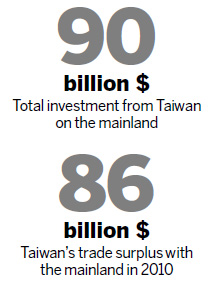Economy
Economic reform won't damage Taiwan interests
Updated: 2011-03-15 11:04
By Zhao Yinan and Li Tao (China Daily)
BEIJING - Premier Wen Jiabao gave an assurance on Monday that Taiwan-funded businesses on the mainland will not be marginalized by economic restructuring.
|
|
Wen told a news conference that the mainland's efforts to transform its economic development pattern will create a better investment environment and bring more favorable opportunities to Taiwan companies.
"They will enjoy greater potential for development," he said in response to a question about concerns in Taiwan that the mainland economy's shift to a more environment-friendly pattern could adversely affect some Taiwan-invested businesses that are mainly labor- and resource-intensive.
The mainland has become a major destination for Taiwan investment, with 9 percent of total overseas investment on the mainland coming from the island, he said.
At present, there are more than 80,000 Taiwan-invested businesses on the mainland, with total investment surpassing $90 billion.
Wen said the "early harvest" program of cross-Straits Economic Cooperation Framework Agreement has produced positive results since it took effect on Jan 1.
Noting the existence of problems in the implementation of the agreement, Wen pledged to pursue follow-up negotiations.
The trade volume between the mainland and Taiwan exceeded $140 billion in 2010, with Taiwan's surplus reaching $86 billion, Wen said, adding that trade volume grew 30 percent in January.
"I anticipate Taiwan businesses will enjoy greater development on the mainland," he said.
"The current mainland-Taiwan ratio of labor cost is 1:2.5, while in the past it was 1:12 or even higher," he said.
"Favorable policies, the same language and similar customs - all this add to the investment appeal here, compared with cheaper labor costs in some Southeast Asian countries."
At the news conference, Wen also said Hong Kong is capable of dealing with both regional and international competition and risks, saying its advantage as an international financial center has not changed.
He stressed that the central government's 12th Five-Year Plan (2011-2015) will in no way replace Hong Kong's own plan.
A chapter about Hong Kong and Macao in the five-year plan was intended to support their development, not to be imposed on them, he said.
It was the first time the central government had mapped out an independent chapter about the two special administrative regions in its five-year blueprint.
Yuen Mo, chief of Hong Kong's delegation to the National People's Congress, said government bodies in Hong Kong usually made plans for the following few years separately and without sufficient coordination.
"An integrated plan for Hong Kong's overall development was absent in the past, since these departments were only busy with their own jobs. The five-year blueprint, which maps out the city's long-term development, is crucial to its prosperity in the long run," Yuen said.
Specials

Earthquake Hits Japan
A massive 8.8 magnitude quake hit the northeast coast of Japan on March 11,2011.

NPC & CPPCC sessions
Lawmakers and political advisers gather in Beijing to discuss major issues.

Pictures: quake aftermath
A massive earthquake hit Japan hard, leaving thousands dead.




